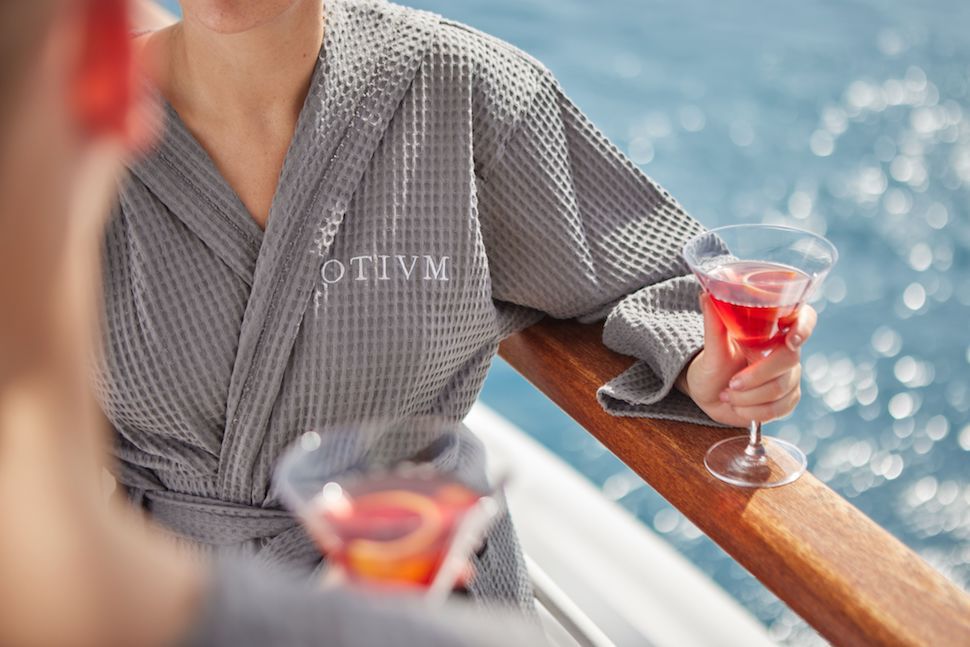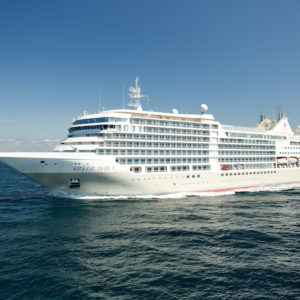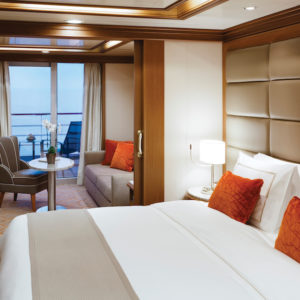
Otium is the new super-luxe experience aboard the luxury cruise line Silversea. So, what does it mean? And how do you pronounce it? And, ultimately, will Otium cause a certain set of people to abandon shore? Let’s take a look.
The word Otium is Latin. It means something like the opposite of work. But Otium is not doing nothing. It’s not mindless bliss. It’s mindful—and it’s not simply luxuriating because that implies a lack of focus. Otium is about showing up, being present in the moment—like when the setting sun hits the sea and there’s a green flash—or not—but the Champagne is perfect. It’s not wallowing because that implies a lack of curiosity, and at some level, absent curiosity, an ultimate experience is like casting caviar before . . . Seriously, a first taste of Russian caviar or Scotch or French Champagne may wrinkle your nose, just as a night of formal wear may dampen your self-expression. C’est la vie! Keep in mind that pretty much all tastes are acquired and the reasons for acquiring them are tribal. And while a true adventure begins when you step outside your tribe and something goes dramatically wrong, a true luxury vacation is seamless and comfortable, and everything goes to plan, only better.
“But isn’t Otium, ‘Let them eat cake?’” my wife pointedly asked a member of the Silversea team.
When she asked, we were in the port of Lisbon aboard the soon-to-be-christened, 40,700-ton Otium flagship, Silver Dawn, which holds 596 passengers, a crew of 411, and just may be the most luxurious cruise ship in the world. Our weeklong cruise was the shakedown, the final test run before the ship entered regular service, and so Silver Dawn was filled with travel agents and journalists rather than paying guests. We were in the ship’s S.A.L.T. Restaurant, conversing between courses of local Portuguese delicacies as we sipped a fine local wine because part of the pride of the Silversea S.A.L.T. program is crafting local culinary experiences at every port of call. As it turned out, the answer to my wife’s question came from Adam Sachs, the former editor of Saveur and creator of the S.A.L.T. food experiences. His words were as easy and smooth and true as the wine. “It’s not let them eat cake,” he said. “It’s let them eat my cake.”
Keep in mind that pretty much all tastes are acquired and the reasons for acquiring them are tribal.
Not Just a Luxury Cruise Experience

Sea trials of the Silver Dawn.
And that gets to the real point: Otium is not just a luxury cruise experience. It’s a no-holds barred competition to provide the world’s very best vacation. While every effort is made toward sustainability—from elaborate emission-scrubbers in what were once called smokestacks, to fuel cells to reduce in port emissions, to wastewater treatment systems that produce almost drinkable water, to sustainably harvested Sevruga caviar—the underlying truth is that most Otium guests are picked up from home in limousines, flown to the port on Business Class if not First, and the ship is a floating palace that gets about 60 feet per gallon. Luxury at sea is actually measured in tons of ship per passenger: The more tons, the more luxurious, and the more fuel consumed. Like buying a ticket into space, if you have to ask such questions, you can’t or won’t afford it.
But what if it is the best vacation in the world? And that brings us to the second question: How to pronounce Otium? Ironically, the answer points to a tribe that Otium challenges: a group of hoteliers who experienced Otium on the Silver Dawn the week before we did. These hoteliers were from high-end resorts, including Four Seasons and Ritz Carlton, land-based venues famous for running tight ships. The hoteliers got a lesson in how to pronounce Otium:
“It’s not Oh! tium. It’s pronounced Awe! tium. Think of it as the sound of jaws dropping.”
To be fair, we heard that anecdote from Roberto Martinoli, the President and CEO of Silversea, so I jotted down the jaw-dropping story with a question mark and a handful of salt. Later, after a week aboard and a couple weeks to reflect, I thought to compare Silver Dawn with the beachfront Four Seasons Maui in Wailea.
Why? Because both “resorts” have roughly the same number of rooms, high-end restaurants, and similar costs—and also because the Four Seasons Maui is now widely familiar as the setting for the HBO series “White Lotus,” a fictional behind-the-scenes look at a week at the resort, and because my wife and I spent our honeymoon there and loved it.
Superb Suites on Land & Sea
Our ocean-view room at Four Seasons was a grand, open rectangle: fully 650 square feet with a 10-foot ceiling. The bathroom had an immense, twin-sink vanity and expansive soaking tub and separate shower, and the king-size bed and finishing were everything Four Seasons. It all felt expansive, the service was superb, and there was an oversized sliding glass door onto the balcony where we drank Champagne each evening as we looked over the trees to the sunset on the ocean. What’s not to love?

Our Silver Suite
Our comparable space aboard Silver Dawn was roughly half the size of Four Seasons—387 feet including the balcony—and the ceiling was less than eight feet. That said, the room experience aboard Silver Dawn felt vastly superior to Four Seasons, by design. Our 387 square feet was a true suite: an ample living room equipped just as well as Four Seasons with two large sliding doors onto a balcony with plenty of space for two chaises at the very edge of the sea. It’s hard to beat an ocean view that you can spill your coffee into—and of course the view keeps changing.
Opposite the balcony is a queen-size bedroom separated from the living room by double pocket doors, then a walk-in closet, a bathroom with twin sinks, a large jetted tub, and separate shower. The separate toilet room and sink are accessible both from the bathing area and the entrance hall so it felt like two separate baths. While all these spaces are tighter than Four Seasons, every space was large enough for this 6’4”, 240-pound man to feel perfectly comfortable.
More to the point, at the Four Seasons there was no private space other than the bathroom so ordering room service for breakfast was something we did once and realized it felt too intrusive to be worth the bother. If you’re private like we are, you really have to go out to eat (not to mention having to get rid of your spouse to write.) On Silver Dawn, however, you have a separate bedroom! You also have a designated butler, and that means you can slide open the pocket doors at the time you choose and find breakfast waiting in the living room. Looking back, our only regret was never trying the other breakfasts on board because the in-suite breakfast was so remarkably pleasant. Not only that, we could both write in-suite without getting grumpy.
And that doesn’t begin to account for the other Otium in-suite experiences that are but a phone call away. On a particularly beautiful day, our butler set up a Champagne and a selection of Otium comfort foods. On a cooler day, he brought cashmere blankets and hot chocolate. On another day he prepared a bath for my wife. And we could have done each of those things and more every day, not to mention having our refrigerator filled with whatever we wanted, whenever we wanted. It’s all included (as is practically everything else aboard ship). Nothing to sign. No tips expected. It felt so glorious just to hang out, even though there were so many other great places to eat and things to do—not to mention a variety of tantalizing excursions on shore.
Bottom line: we spent more time luxuriating in our suite on Silver Dawn than in our much larger room at Four Seasons during our honeymoon. That was a surprise, and why the service is indeed pronounced Awe! tium.
Stephen Kiesling
Stephen Kiesling is a writer and editor whose career was launched in 1982 with the classic rowing book The Shell Game and The New York Times Book Review, “Just as it is good that there was a riverboat pilot who could write…it is good that there is one true blue jock who can.” A Scholar of the House in philosophy at Yale, Stephen was a 1980 Olympic oarsman who also raced in the 2008 Olympic Trials. He learned journalism from T George Harris, a decorated World War II artillery scout and Time reporter who created Psychology Today. T George and Stephen launched both American Health magazine and Spirituality & Health, where Stephen continues as Editor at Large. He has written for the New Yorker, Sports Illustrated and Outside, was a spokesman for Nike, started a celebrated rowing club, and has built parks and playgrounds. He lives at Ti’lomikh Falls on the Rogue River in southern Oregon, where he writes for his wife Mary Bemis at Insidersguidetospas.com. Stephen is also the caretaker of one of America’s oldest Salmon Ceremonies and is working on a whitewater park and sculpture garden. He is interested in transformational retreats, anything to do with water, the Native American origins of our democracy, and the process of becoming what he calls an Earth-Indigenous Elder, a person who knows their own story from the beginning of time.